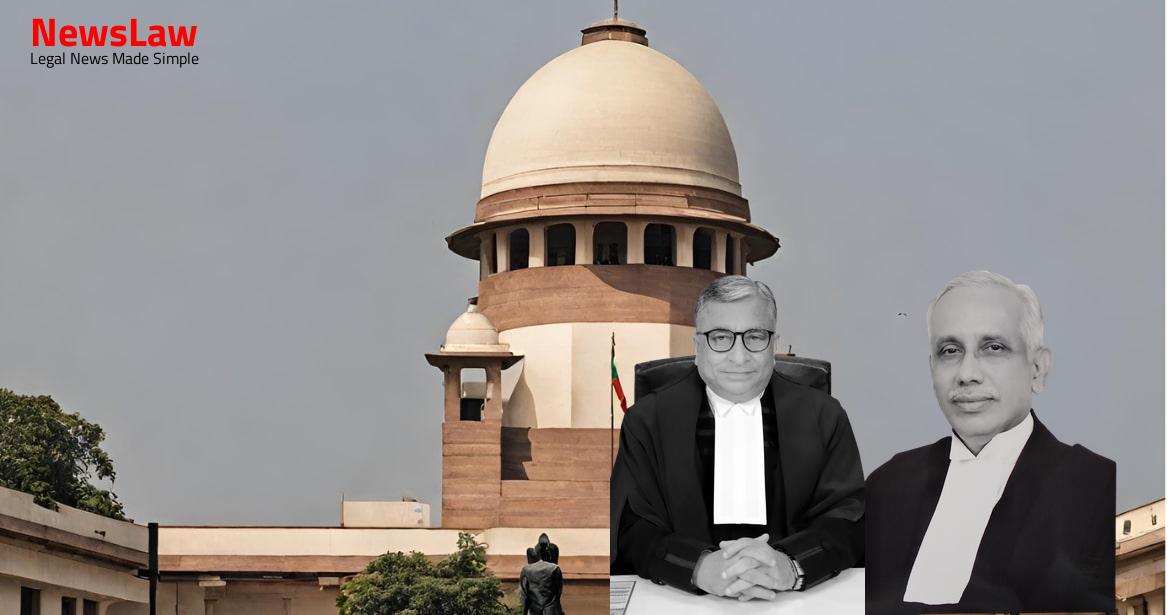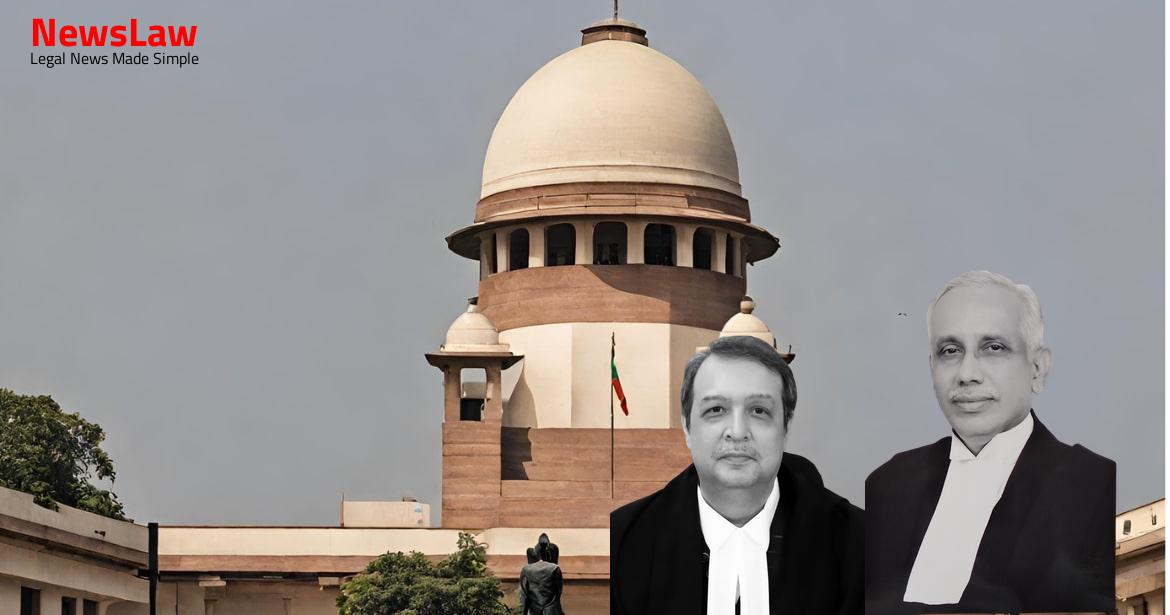Explore the in-depth legal scrutiny in a case involving a suspected poisoning death, where the court meticulously analyzes witness statements, medical reports, and circumstantial evidence. The judgment delves into the complexities of establishing guilt in instances of alleged poisoning, highlighting the importance of rigorous legal analysis in criminal cases.
Facts
- The deceased was suffering from high Eosinophilia and had complained of dry cough.
- DW1 treated the deceased from 01.12.2010 to 19.12.2010.
- The deceased had a history of tuberculosis before marriage.
- During the treatment by DW4 from 02.06.2007 to 31.08.2010, the deceased never complained about TB.
- The deceased was under treatment for a total of 3 years from 02.06.2007 to 31.08.2010.
- The deceased was found to have a weight of only 39 kilograms, below the normal limit.
- No injury was found on the body of the deceased as per the inquest report and post mortem.
- The cause of death of the deceased was not confirmed to be due to poison.
- There was no evidence of poison found during the search in the house of the deceased.
- The oral evidence presented by the prosecution ruled out physical cruelty related to dowry and tuberculosis as the cause of death.
- Contradictions were found in the evidence of prosecution witnesses PW1 and PW2 regarding the demands for dowry.
- The accused were sentenced to life imprisonment under Section 304-B of the IPC.
- The prosecution proved that the deceased was killed due to cruelty and harassment for dowry.
- The High Court found discrepancies in the medical opinions provided by the defense witnesses regarding the deceased’s medical condition.
- The court highlighted the lack of proper explanation from the accused regarding the presence of the deceased’s body in the car.
- The High Court concluded that the deceased was not suffering from tuberculosis based on the evidence presented by defense witnesses.
- The High Court also criticized the defense witnesses for issuing false certificates to protect the accused.
- The court emphasized the need to establish three elements in cases of poison: death by poisoning, the accused’s possession of the poison, and opportunity to administer the poison.
Also Read: Legal Analysis of Lease Deed Commencement Date
Arguments
- No poison was found in the house of the appellants.
- There was no demand for dowry from the beginning.
- The appellants were found guilty under Section 304-B read with Section 498A and Sections 3 and 4 of the Dowry Prohibition Act.
- The prosecution has not proved that the death was unnatural.
- The deceased weighed just 39 kilograms, indicating her illness and health condition.
- No marks of any injury were found on the deceased.
- The denial by the first appellant during questioning by the Court under Section 313 suggests his complicity.
- The High Court reversed the judgment of acquittal by the Sessions Judge without a basis.
- Acquittal by the Trial Court reinforces the presumption of innocence.
- No poisonous substance was found in the viscera, raising questions on the High Court’s verdict of guilt.
- The learned Senior Counsel for the appellant argued against relying on the statement in the Affidavit of the second appellant in the Bail Application about the death being a suicide.
- The argument made was that this statement should not be considered part of the evidence in the case.
Also Read: Analysis of Jurisdiction and Exemption in ESI Act Case
Analysis
- The case involves the death of Priyanka due to suspected poisoning and the recovery of her body from a car parked outside the accused’s house.
- The trial court’s judgment is being analyzed for being unjust, ignoring material evidence, and misreading documents like dying declarations and forensic reports.
- The prosecution’s case is based on allegations of demand for dowry and torture by the accused, but evidence of poisoning is inconclusive.
- The High Court’s decision to overturn the trial court’s acquittal is being questioned based on lack of compelling reasons.
- Various witness testimonies and medical reports present conflicting information on the cause of death and the presence of poison.
- Challenges in proving poisoning without concrete forensic evidence are highlighted, along with discrepancies in witness statements.
- The importance of circumstantial evidence in poison murder cases is emphasized, as well as the need for exhaustive evidence to establish guilt.
- Inconsistencies in witness accounts and lack of concrete proof of poisoning cast doubt on the prosecution’s case.
- The role of medical evidence, witness credibility, and circumstantial factors in establishing guilt is being scrutinized in the judgment analysis.
- The accused, a teacher, is presumed innocent until proven guilty.
- In the case of Bhupinder Singh v. State of Punjab, it was noted that the accused’s presence of poison is not always necessary to establish guilt, and circumstantial evidence can be sufficient.
- In Anant Chintaman Lagu v. State of Bombay, it was established that even if the exact cause of death is not determined, guilt can be inferred based on circumstantial evidence of poison or unrecognized substances acting as poison.
- The judgment in Ghurey Lal v. State of Uttar Pradesh emphasized the wide power of the appellate court to reevaluate evidence in appeals against acquittal.
- The court highlighted that the person administering poison in secrecy would not keep a portion for investigation, and circumstantial evidence can lead to a finding of guilt.
- The importance of substantial and compelling reasons for challenging the trial court’s decision was emphasized in multiple cases, such as Sharad Birdhichand Sarda v. State of Maharashtra.
- In cases of murder by poisoning, evidence of motive, cause of death by poison, possession of poison, and opportunity to administer the poison are crucial for conviction.
- The absence of evidence on cause of death by poisoning and lack of possession of poison by the accused can lead to acquittal.
- Circumstantial evidence creating a network pointing to the accused’s guilt is significant in determining murder by poisoning.
- The court emphasized the presumption of innocence for the accused and the importance of compelling reasons to overturn an acquittal in cases of poisoning.
- The circumstances do not indicate that the deceased died an unnatural death or that the appellants administered poison to her.
- The appellants themselves notified the Police, which supports their innocence.
- The High Court has erred in interfering with the acquittal of the appellants.
Also Read: Legal Analysis of Toll Plaza Location Rule Violation
Decision
- The first appellant in custody to be released unless needed in another case
- The Appeals are allowed
- Impugned judgment of the High Court set aside, Sessions Judge’s judgment restored
- Only appellants 2 and 3 are already on bail; their bail bonds to be discharged
Case Title: SANDEEP KUMAR Vs. THE STATE OF UTTARAKHAND (2020 INSC 671)
Case Number: Crl.A. No.-001512-001513 / 2017



